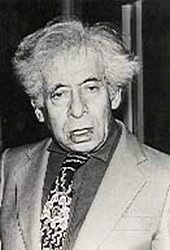Avoth Yeshurun
אבות ישורון

Avoth Yeshurun (1904-1992), was born in Ukraine as Yehiel Perlmutter. He was raised in a Hassidic home and immigrated to Eretz Israel in 1925. His family was killed during the Holocaust. Yeshurun spent a great deal of time in rural Jewish and Arab villages, intermittently dredging swamps, picking fruit and working as a watchman and a construction worker. In later years he became a regular contributor to the literary journal Siman Kriah. He was awarded the Brenner Prize (1967), the Bialik Prize (1979) and the Israel Prize (1992). “Language,” wrote Yeshurun, “is in the hands of the artist. He doesn’t feel it until he breaks it; and when he lets it slip and fall… he hears its voice, the language that is his.” Hence Yeshurun’s mixed tenses, unusual syntax and the collapsing of tongues – Yiddish, Arabic, Polish, American and Israeli slang – in the creation of what has been described as “half-and-half Hebrew.” Translator and poet Gabriel Levin has called him “Israel’s most innovative poet to date”, and indeed Yeshurun frequently combines his idiosyncratic style with political themes and a tone ironically or elegiacally moralistic. A poetry of parts, Yeshurun’s work contains elements from all of his varied experiences, “and all of this,” Levin goes on to say, “adds up, piece by piece, to a broad, complex vision of Eretz Israel: the poetry’s jagged surface reflecting not only the tears of the poet’s own life, but the life of the entire nation.”

